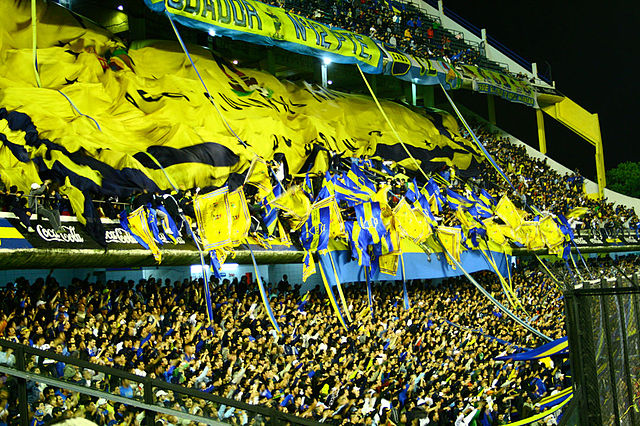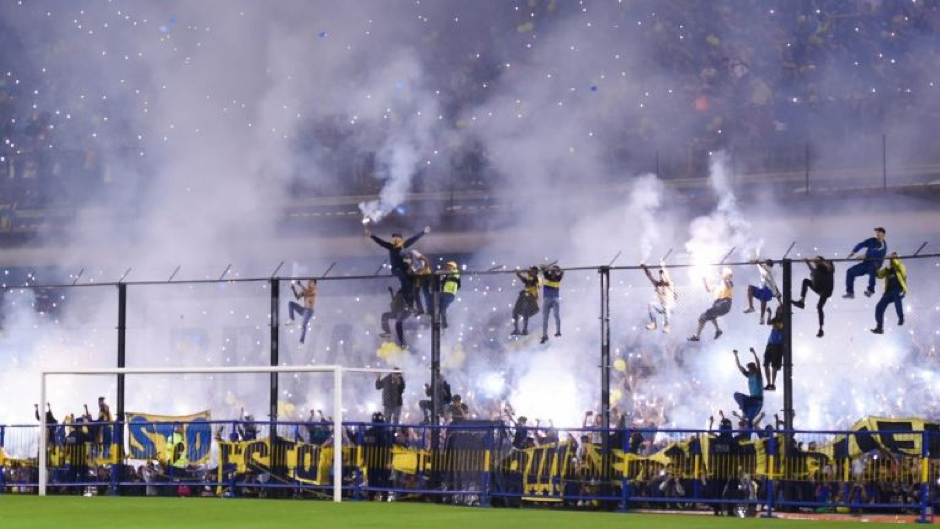Derby Days in football have always brought incredible passion, emotions and drama. It is the fight between two close cities or even within the city. Popular ones across Europe are Liverpool-Everton, Roma-Lazio, Dortmund-Schalke or Galatasaray-Fenerbahce. The passion and animosity doesn’t just stay on the pitch: as much as dangerous tackles and hatred between players can go far, the real excitement and rivalry can be felt between the sets of fans, in the stands and in the streets. The “12th man”, as they call the fans, often initiate the tensions around the games, even outside the stadium. This year, a very striking example of this inner city rivalry exploded beyond the regular boundaries of passion for the beautiful game.
The stage is set in Buenos Aires, Argentina: River Plate and Boca Juniors go head to head in the Copa Libertadores, the equivalent of the UEFA Champions League in South America. Not only has the rivalry existed for over a century, this game takes place in the final of the 2018 edition: a two-leg game, the last final in the competition to be played this way, full of sheer passion. The two legs are two weeks apart, with the tension hanging over in the city.

The two clubs couldn’t be more different.; River Plate promoting the beautiful game, with the stadium in Núñez, the northern, wealthier part of Buenos Aires, while Boca Juniors, originating in the working class background of the club set in La Boca area of the city, care more about the hard graft than style. The rivalry between the two clubs always brings sparks, making the Superclasico one of the must-watch games in every football fan’s life. With such high stakes, the tension was bound to be at its climax. To limit the risks, the South America federation, CONMEBOL, decided to ban the away fans from the stadiums. The danger was transferred to the streets…

First leg (Part 1): La Bombonera, Boca Stadium, 10th November 2018. Both teams have prepared for such a major event, worldwide television transmission, the supporters are as tense as ever: media, fans and players are all ready to go to war in the Copa Libertadores final 2018. First setback of the story, torrential rain falls on Buenos Aires almost like a sign of God that things are going to be difficult. The streets are teeming with fans setting off fireworks and flares, mixed with thunder, lightning and heavy rain. More seriously, the pitch is flooded. Less than two hours before the game, after letting in all Boca Juniors with their famous blue and yellow colours into the stadium, the officials decide to postpone the game. Frustrated fans are sent for the night to return the next day for another round..
First leg (Part 2): fans, players and media gear up for another go at this first leg in Boca’s backyard. After a very tense match of scrappy football, dangerous tackles and offensive chants throughout the game from the home fans, the first battle ends 2-2, giving a slight advantage to River Plate with the away goal rule. The red and white army prepares for the second round of battle on their home turf two weeks later. Or so they thought…
The two weeks between the games are electric; no one wants their team to lose, no one want to lose their bragging rights over the colleagues and classmates. There is far more to lose than to gain from this game from a supporter’s perspective. Banners, chants, kits and scarves all prepared, the sets of fans and the teams are ready to go back again for the final confrontation.

Second leg (Part 1): Every time Boca and River have played each other in the Copa Libertadores (although never in the final), there has been serious conflicts before the second leg, from fans tear gassing River Plate players in 2015 to Carlos Tevez Tevez’ celebratory chicken, dance, a notorious insult to River Plate, for his late winning goal.. A fan burning their neighbour’s house after a disagreement over the game was the first sign that things were going to go terribly wrong in 2018. Setting the stage: El Monumental, the national stadium where Argentina lifted the World Cup in 1986, home of the red and white team of River Plate, 24th November 2018.

Everyone is talking about the game, the game of the century for Argentinian fans. Although there will not be Boca fans inside the stadium, big
The police take action with military tear gas to push the crowd back from the team bus, but once the bus windows smash, they eventually attack the Boca players as well. Hundreds get injured, women and children are crying, the atmosphere is like a volcanic eruption, uncontrollable. FIFA and CONMEBOL officials are told to evacuate the stadium, while the River Plate fans inside the stadium continue partying happily and somewhat peacefully, not knowing about the hectic mess that is unraveling outside. Rumors start circulating like wildfire, with uncertainty growing as to whether the match will go ahead. After several announcements of delays and general confusion, the CONMEBOL officials indefinitely suspend the final and fans are evacuated from the stadium, leading to rioting and multiple injuries.

There starts the intolerable wait for the game to be rescheduled. Boca demand for the match to be postponed later than the next day so that all players can recover from their injuries and to play on level terms. On 29th November, CONMEBOL eventually decide to move the game to 9th December for safety reasons in the neutral Real Madrid stadium of Bernabeu. With the trip to Madrid costing more than two monthly average salaries in Argentina, only the wealthy fans from Argentina and those who live in Europe can afford to go to the game. Huge disappointment can be felt in the country, where the majority feel a huge frustration of not seeing the most important game in their clubs’ history due to a minority of fans who took things too far. The final game delivers a 3-1 win for River Plate after extra-time, making River Plate the winners of the most dramatic final in Copa Libertadores history, if not football history from a fan’s perspective. However, the audiences and attention for the game is falling with the focus now more on the real issue: where do you draw the line for passion for the beautiful game?

Fan stories of the derby have been passed through generations; heart attacks, suicides due to relegation in 2011, riots and player abuse… A country driven by passion can certainly boost to the teams they support – the famous “12th man” – but is it really a question of life and death? Sport is above all a form of entertainment and the fans seem to lost sight of that. If anything, football, like many sports, can provide a distraction from everyday problems: many fans struggle with alcohol, addiction, unemployment and poverty. These incidents have simply brought more problems to the game which is supposed to help them.
On the one hand, you have the passionate fan, chanting with his friends, supporting his team on matchday, showing his colours and celebrating goals and titles. On the other hand, you have the abusive fan, shown in all his glory during the Superclasico, the rioting fan, the football fanatic, ready to kill his rivals, to burn down his neighbour’s house, to cause chaos and ultimately to ruin everyone’s experience of the match. In the same vein, you have the fans who insult players, shouting racist and homophobic abuse. Unfortunately, with such misconduct and violence, the fans could be destroying the game, the same game they make so magical.

Murder, abuse, violence – be it verbal or physical – must be banned in the sport, inside and outside the stadium. Similarly to the French Classique between PSG and Marseille, when there were murders and injuries every year, the Superclasico has shown exactly why the game has to change to move forwards. Rivalry between fans really has gone too far. A couple of dirty tackles and a fisty-cuffs between players on the pitch should be as far as it goes, allowing bragging rights over a coffee break at the office. The fans must make the first move to reducing the violence.

Football may be the most popular sport in the world – it is also, in my opinion, the most beautiful. The fans are an integral part of the gameas they embody football; the sport would not be what it is without the fans. Bring back the true passion for the game and give us back the beautiful game where parents can take their children to a game without worrying for their lives.
If you want to live the full experience of the passion in Buenos Aires during this explosive period, you can watch Copa90 Derby Days Superclasico Documentary